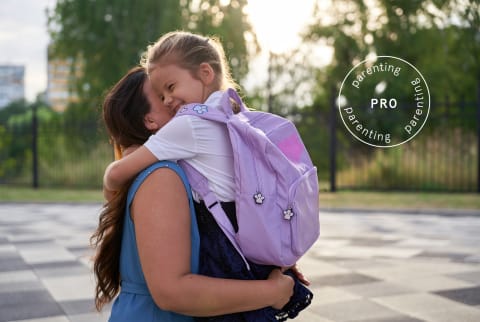Advertisement
I'm An Education Psychologist & Here's How I Tell Parents To Prep Their Kid For Back-To-School


August is still prime time for pool parties and backyard barbecues, but this month also finds parents "penciling in" a little something extra on their calendars: back-to-school prep. No doubt, most kids would say that by August, they had a good run. Staying up late, sleeping in even later, and a respite from jam-packed calendars are always welcome, but summertime shenanigans have to end at some point, right?
And while shopping for new clothes and school supplies may be fun, back-to-school prep is more than just buying notebooks and pencils; it's doing what you can to help your child survive the first day of school and thrive throughout the school year.
Ahead, licensed education psychologist Reena B. Patel, LEP, BCBA, shares some sage advice on how parents can help their kids come back in the fall comfortable and prepared.
Start early
But when it's time to get back into the swing of things, Patel urges parents to start prepping early — at least two to three weeks before the first day is best. "Parents should think about getting into nighttime routines, adjusting sleep schedules, and reverting daily routines to where they should be," she says.
We'll add here that according to the American Academy of Sleep Medicine (AASM), school-age kids need nine to 12 hours of sleep per day, and teens need eight to 10 hours. Unwinding wonky summer schedules can take some time, and making changes overnight (literally) can set everyone up for disaster on the first day.
To ensure everyone gets off on the right foot, parents should take care to make adjustments gradually. Your best bet is to move your child's bedtime a little earlier every night until they're where they need to be to meet their sleep requirements and still wake up on time.
Address their anxiety
"Anxiety stems from a fear of the unknown," says Patel. "A new school year means a lot of changes. For some, it could also mean a new school, a new classroom, new teachers, and even a new peer group."
To quell these fears, especially for the younger ones, she encourages parents to take advantage of orientation sessions schools typically offer before school begins.
Kids are more likely to feel comfortable once they've had a chance to visit the school and walk around. Patel adds that parents can do even more to "remove the fear factor by pulling up the school website, looking at teacher bios, and maybe even sharing the pictures with their kids."
If your child's school doesn't offer orientations prior to the first day, Patel encourages parents to reach out to the school principal, administrators, or directors and ask for an individual 15-minute meet and greet. You can also ask for (or take) an informal tour to find out what their lockers are, where the cafeteria is, and other important touch points your child may need during the day.
"This is especially important for kids who are nervous or those who need a little more reassurance," says Patel.
If you're worried about not getting access, keep in mind that teachers and office administrators are often there anyway, getting things ready, and many would happily take some time to help a future student.
Help the little ones get acquainted
For little kids who are still working on their social and emotional learning skills, Patel says parents can help them ease the stress of introductions with their teacher by "creating a quick little one-pager with a summary about their child. This can include a picture of your child, fun facts, and other things the teacher may need to know," says Patel.
And while most seasoned teachers will do it anyway, Patel says, "Parents could also add any information regarding allergies, what type of motivation their child responds to, and their learning style."
Let older kids take the reins where appropriate
While parents often have to do more to help younger kids get acclimated and comfortable at the start of each school year, Patel encourages them to let the older kids spread their wings a little. "It's really important to teach children how to self-advocate," says Patel.
Instead of a snowplow parenting style, where you do everything for your child, take a step back and give them some space to flex their autonomy and "do" and accomplish things for themselves.
Patel reminds parents that this advice is heavily dependent on age and maturity.
"Middle and high schoolers may have more of a handle on how to do this for themselves, whereas elementary-age students may need a little more coaching and direction," she says, noting that parents should adjust accordingly.
Keep calm and don't overwhelm them
Parents are often just as excited to talk about the first day of school with their kids, but Patel cautions, "When your child gets in the car after a long day of school, you don't want to hit them with a barrage of questions. Let them just sit and decompress for a little after school. There's a lot to take in, and we need to give them a minute to process and recoup from the sensory overload that typically comes along with the first day of school. Give them an opportunity to take it all in and let them come to you when they're ready to share," she says.
It's better for everyone.